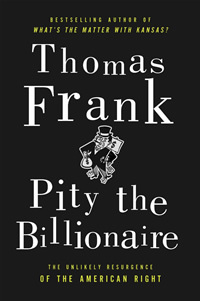I have a review of Pity the Billionaire by Thomas Frank, one of the few left-wing writers I believe conservatives can read with pleasure. He is old fashioned, so old-fashioned indeed that most American leftists would not call him left-wing. He has no time for the culture wars, which still stir the passions of so many on the right and left (and not only in the US). Instead he has concentrated on why ordinary working and middle class Americans do so badly when Wall Street is thriving and have to bail it out when it fails. Since 2008 events have justified him with a vengeance.
He is also a dazzling writer: honest, sardonic, scornful and literate – worth one thousand Michael Moores. Here he is writing with justifiable astonishment about the Tea Party’s
reaction to the greatest banking crisis since 1929.
As the mass of working and middle class people in Britain are seeing their living standards slashed while the City is bailed out, ordinary Tories may find themselves agreeing with him despite themselves.‘To rage so violently against financial supervision is, admittedly, a peculiar way of responding to a severe downturn brought on by a largely unsupervised financial sector. It is not how Americans reacted in the past. Up until now, the social patterns of hard times were thought to be a simple thing, as impersonal and as mechanical as the forces that shutter our factories and bid down the price of our stocks. Markets disintegrate, layoffs mount, foreclosures begin, and before you know it, the people are in the streets, screaming for blood. We grow desperate, anxious, rebellious. We demand that the government do something about it – that they punish the perps, that they rescue the victims. We look for insurance against further catastrophe, and stricter regulation of the economy, to make sure it doesn’t happen again. But that’s not what happened in 2009 and 2010. What we saw is something unique in the history of American social movements: a mass conversion to free-market theory as a response to hard times. Before this recession, people who had been cheated by bankers almost never took that occasion to demand that bankers be freed from “red tape” and the scrutiny of the law. Before 2009, the man in the bread line did not ordinarily weep for the man lounging on his yacht.’







Comments